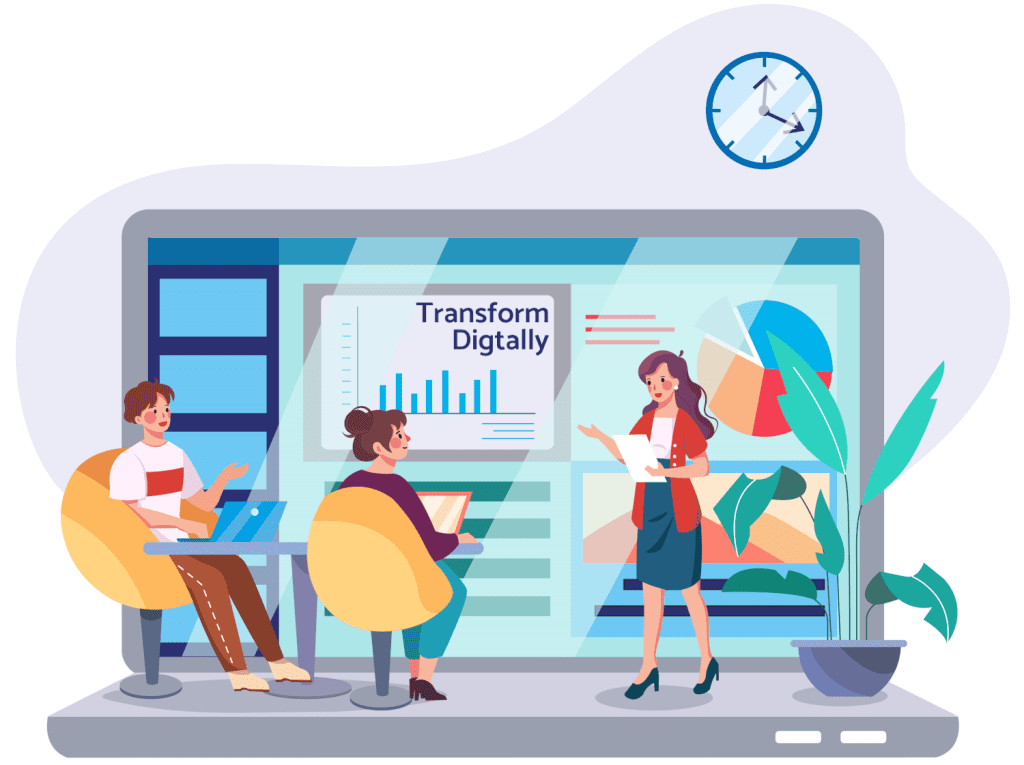Introduction: Understanding Digital Transformation
What is a Digital Transformation? In simple terms, digital transformation is about using digital technology to make your business work better. It involves taking the tasks you already do in your business—like managing customer orders, keeping track of stock, or communicating with your team and finding ways to improve them with technology. The aim is to make your business more efficient, save time, and improve the experience for your customers.
It’s not just about buying new software or devices; it’s about rethinking how your business works. You might look at how to make your daily processes smoother or how to communicate with customers in a faster, more modern way. Digital transformation is like an upgrade for your business, bringing in new tools and ideas to make your work easier and more effective.
Why is Digital Transformation Important?
For many businesses, digital transformation can make a big difference. By using digital tools, businesses can:
- Save Time and Money: Automated processes can reduce the time spent on repetitive tasks, helping you focus on more important things.
- Improve Customer Service: Digital solutions, like online customer support, help you serve customers faster and more efficiently.
- Stay Competitive: As more businesses go digital, adopting new technology can help you keep up with or even get ahead of competitors.
Why Digital Transformation Matters for Your Business
In today’s world, digital transformation isn’t just an extra option it’s becoming necessary for businesses to keep up. Customers expect fast, easy services and products, and businesses that don’t use technology may struggle to meet these expectations. Here’s how digital transformation can make a real difference for your business:
Boosts Efficiency
Digital transformation helps you run your business more smoothly. By using digital tools to automate tasks, you can get things done faster and with fewer mistakes. For example, you could set up a system that automatically tracks stock levels, sends customer reminders, or even handles parts of your accounting. This saves time and means your team can focus on tasks that need a personal touch, like building customer relationships.
Creates Better Customer Experiences
Today’s customers expect businesses to be responsive, friendly, and convenient to work with. With digital transformation, you can personalise how you communicate with each customer, making them feel valued. For example, with the right software, you could send special offers to certain customers based on their buying history or send follow-up emails after a sale to ask if they’re happy with the service. This kind of attention builds customer loyalty and keeps them coming back.
Encourages Innovation and Growth
Digital transformation isn’t just about fixing current problems; it’s also about opening new doors. By exploring digital options, you might discover new ways to sell your products, reach different customers, or create additional services. This can set your business apart from competitors and keep it fresh and up-to-date. For example, you might develop a mobile app for customers to place orders directly, or create an online booking system that lets customers schedule appointments 24/7.
How Custom Software Can Help
Custom software solutions can make digital transformation even more effective for your business. Unlike off-the-shelf software (which may have extra features you don’t need), custom software is built for exactly what your business does. Here’s how custom software can help with digital transformation:
- Automates Processes Just for You – Custom software allows you to automate specific tasks that are unique to your business. For example, if you run a small manufacturing business, custom ERP software can help you manage production schedules or quality control in a way that general software might not. This tailored approach ensures that your processes are more efficient, saving you time and reducing the risk of errors.
- Enhances What You Offer – Custom software can add features to your product or service that make it more valuable to customers. For example, you could have a customer portal where clients can log in, view their orders, and request support. These kinds of features improve your product or service and make your business more appealing.
- Engages Customers in New, Flexible Ways – Custom software allows you to interact with your customers in ways that make sense for your business. For example, you might set up automatic email updates, create a custom feedback form, or design a simple app for customers to order directly from you. This flexibility is key to creating experiences that feel modern and personalised.
Key Areas of Digital Transformation
When we talk about digital transformation, it’s helpful to understand the main areas where it can make a difference in your business. Each of these areas can be improved with custom software, which is designed to fit your business exactly. Here’s a simple breakdown of these key areas:
Business Model Transformation
Digital transformation can help you change, or “pivot,” your business model to offer new services that customers want or to improve what you already offer. For example, if you run a shop, you might set up an online platform where customers can buy your products without coming into the store. Or, if you provide a service, you could offer an app that lets customers book appointments or track their progress online. By using custom software, you can adapt to new market demands, reach more customers, and create new income streams.
Process Optimisation
Process optimisation is about making the day-to-day tasks in your business simpler and more efficient. Custom software can automate routine jobs, such as sending invoices, tracking stock, or managing bookings, so you don’t have to do them manually. This can save you time and reduce errors, which ultimately cuts costs. By freeing up time from these repetitive tasks, you and your team can focus on bigger, strategic projects—such as developing new services or improving customer relationships.
Product Innovation
Product innovation means adding new features or technologies to your products to make them more valuable to your customers. Using custom software, you can give your products added abilities that meet modern customer needs. For instance, if you make or sell physical products, you could add IoT (Internet of Things) capabilities that allow products to connect to other devices or provide real-time updates. Alternatively, you might use AI (Artificial Intelligence) to offer smart recommendations to customers based on their past purchases. These technologies can make your products more attractive, stand out from competitors, and meet the evolving needs of customers.
Employee Experience
Digital transformation doesn’t just help with customer-facing activities; it also improves how your team works together. Custom software can make it easier for employees to communicate, share information, and work on projects, especially if some team members work from home or in different locations. For example, with custom software, you could set up a simple, secure system for file sharing, scheduling, or task tracking. Improving the tools your employees use can make their jobs easier and more enjoyable, which leads to higher productivity and a better working environment.
Customer Experience (CX)
Finally, digital transformation can greatly improve customer experience (CX), which is how customers feel about doing business with you. Custom software allows you to create a seamless and personalised experience, whether through a mobile app, an online shop, or an AI-driven customer support tool that can answer customer questions at any time. For example, an e-commerce platform with a smooth checkout process and tailored recommendations will likely make customers more satisfied and encourage them to return. When customers feel valued and have an easy, enjoyable experience, they are more likely to stay loyal to your business.
How to Start with Digitally Transforming Your Business
Getting started with digital transformation might seem overwhelming, especially if you’re not very familiar with technology. But don’t worry, taking small steps can lead to big changes. Here’s a simple guide to help you begin the process of transforming your business digitally.

Think About Your Business Needs
Start by considering where your business could work more smoothly or where you face regular challenges. For example, are there repetitive tasks that take up a lot of time? Are customers asking for online services, or are there ways your products or services could be improved with technology? Make a list of areas where you think technology could help.
Set Clear Goals
Once you have a list of needs, decide on specific goals for your digital transformation. These don’t have to be complicated. For example, you might want to reduce the time spent on managing orders, improve how you communicate with customers, or make it easier for employees to work from different locations. Having clear goals will help you and any technology partner you work with understand what success looks like.


Get Expert Advice
Digital transformation is easier with the right guidance. If you’re not sure what technology to use or where to start, a consultant or software expert can help. They can look at your list of needs and goals and suggest solutions that suit your business. Working with experts can save time and make sure you’re using technology in the most effective way.
Start with Small Changes
You don’t have to change everything at once. Start with one or two small projects that match your goals. For instance, you might begin with automating a simple task, like setting up a system to send automatic emails to customers. Small wins can give you confidence and show your team the benefits of digital transformation.


Measure Progress and Make Adjustments
As you begin using digital tools, keep track of how they’re helping (or not helping) your business. If you see improvements, great! If something isn’t working as expected, don’t be afraid to adjust it or seek further advice. The goal is to find the right tools and processes that make your business run more smoothly.
Ready to learn more? Head over to our digital roadmap with custom business software post to get started, or dive into 6 mistakes to avoid for practical advice on steering clear of common challenges.
Why BSPOKE Software is the Ideal Partner for Your Custom Software and Digital Transformation Project
BSPOKE Software has over 15 years of experience creating custom software solutions that help businesses succeed. We specialise in developing software for desktops, mobile devices, and online portals. Our team has a strong track record of helping companies improve their operations and grow. When you work with BSPOKE Software, our consultants will take the time to understand your business needs and create a project plan that aligns with your digital transformation goals.
At BSPOKE Software, we believe that your software should be more than just a tool—it should be a solution that directly supports your business success. We work closely with you to design software that aligns with your goals, improves efficiency, and supports long-term growth. Our approach ensures that the software we create is built specifically for your business, making it a valuable part of your daily operations.
Ready to begin your digital transformation journey? Contact BSPOKE Software today. Let us help you build the custom solutions that will give your business the tools it needs to thrive in a digital world.
Overcoming Challenges in Digital Transformation
Starting digital transformation can bring up a few challenges, especially if your business has older technology or limited experience with new software. Here’s how custom software can help overcome these common issues and make the process smoother.
Legacy Technology
Many businesses still rely on older systems that may be slow or unable to connect with modern tools. These outdated systems can hold your business back, making it harder to grow and adapt. Custom software can replace these “legacy” systems with new, more flexible technology that meets current needs. For example, moving to a cloud-based solution means your data can be accessed from anywhere and securely backed up. This makes it easier to add new technology, like AI (Artificial Intelligence) or machine learning, that can help you make smarter decisions and work more efficiently.
Common Roadblocks
- Skill Gaps: Sometimes, staff don’t have the skills to use new software right away. Custom software can be designed to be user-friendly, making it easier for your team to learn and use. Training and support from your software partner can also help fill any gaps.
- Resistance to Change: Employees might feel uncertain about using new technology. Custom software can be introduced gradually, allowing your team to get comfortable with smaller changes before bigger updates are rolled out.
- Budget Constraints: Digital transformation doesn’t have to be done all at once. Custom software can be developed in stages, focusing first on the areas that will have the biggest impact. This makes the process more affordable and allows you to invest as you see the benefits
Custom software can be built to grow with your business, making it a flexible and scalable solution. As your needs change, new features or improvements can be added without starting from scratch.
The Future of Digital Transformation – Continuous Journey
Digital transformation isn’t something you do once and finish; it’s an ongoing journey. As the market, technology, and customer expectations change, your business and software will need to adapt. With custom software, you have a solution that can grow with you. Over time, you can add new features, improve processes, and take advantage of emerging technologies to keep your business competitive. This means your business stays current and can continue to meet customer needs in new ways.
What is a Digital Transformation – Recap and Final Thoughts
Digital transformation is key for businesses that want to stay competitive, create better customer experiences, and run more efficiently. Custom software is at the heart of this transformation, as it provides solutions built specifically for your business’s needs. By modernising systems and adopting digital tools, you can overcome challenges, adapt to change, and set your business up for continuous growth.
Ready to start your digital transformation? Partner with BSPOKE Software to develop cost effective custom software solutions that will help you modernise and reach your goals. Contact us today to take the next step in transforming your business.

